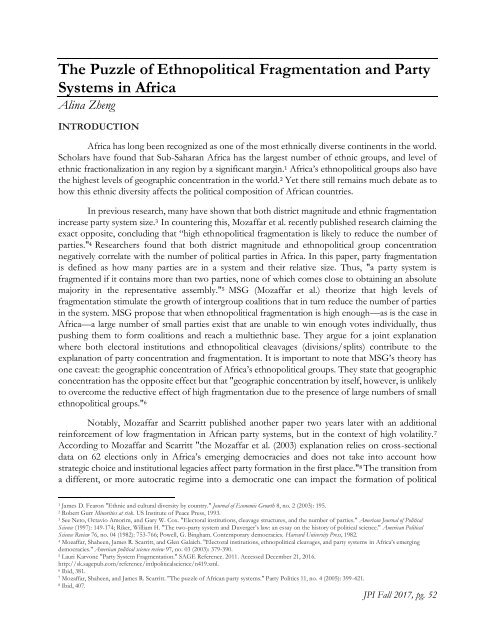Fall 2017 JPI
You also want an ePaper? Increase the reach of your titles
YUMPU automatically turns print PDFs into web optimized ePapers that Google loves.
The Puzzle of Ethnopolitical Fragmentation and Party<br />
Systems in Africa<br />
Alina Zheng<br />
INTRODUCTION<br />
Africa has long been recognized as one of the most ethnically diverse continents in the world.<br />
Scholars have found that Sub-Saharan Africa has the largest number of ethnic groups, and level of<br />
ethnic fractionalization in any region by a significant margin. 1 Africa’s ethnopolitical groups also have<br />
the highest levels of geographic concentration in the world. 2 Yet there still remains much debate as to<br />
how this ethnic diversity affects the political composition of African countries.<br />
In previous research, many have shown that both district magnitude and ethnic fragmentation<br />
increase party system size. 3 In countering this, Mozaffar et al. recently published research claiming the<br />
exact opposite, concluding that “high ethnopolitical fragmentation is likely to reduce the number of<br />
parties." 4 Researchers found that both district magnitude and ethnopolitical group concentration<br />
negatively correlate with the number of political parties in Africa. In this paper, party fragmentation<br />
is defined as how many parties are in a system and their relative size. Thus, "a party system is<br />
fragmented if it contains more than two parties, none of which comes close to obtaining an absolute<br />
majority in the representative assembly." 5 MSG (Mozaffar et al.) theorize that high levels of<br />
fragmentation stimulate the growth of intergroup coalitions that in turn reduce the number of parties<br />
in the system. MSG propose that when ethnopolitical fragmentation is high enough—as is the case in<br />
Africa—a large number of small parties exist that are unable to win enough votes individually, thus<br />
pushing them to form coalitions and reach a multiethnic base. They argue for a joint explanation<br />
where both electoral institutions and ethnopolitical cleavages (divisions/splits) contribute to the<br />
explanation of party concentration and fragmentation. It is important to note that MSG’s theory has<br />
one caveat: the geographic concentration of Africa’s ethnopolitical groups. They state that geographic<br />
concentration has the opposite effect but that "geographic concentration by itself, however, is unlikely<br />
to overcome the reductive effect of high fragmentation due to the presence of large numbers of small<br />
ethnopolitical groups." 6<br />
Notably, Mozaffar and Scarritt published another paper two years later with an additional<br />
reinforcement of low fragmentation in African party systems, but in the context of high volatility. 7<br />
According to Mozaffar and Scarritt "the Mozaffar et al. (2003) explanation relies on cross-sectional<br />
data on 62 elections only in Africa’s emerging democracies and does not take into account how<br />
strategic choice and institutional legacies affect party formation in the first place." 8 The transition from<br />
a different, or more autocratic regime into a democratic one can impact the formation of political<br />
1 James D. Fearon "Ethnic and cultural diversity by country." Journal of Economic Growth 8, no. 2 (2003): 195.<br />
2 Robert Gurr Minorities at risk. US Institute of Peace Press, 1993.<br />
3 See Neto, Octavio Amorim, and Gary W. Cox. "Electoral institutions, cleavage structures, and the number of parties." American Journal of Political<br />
Science (1997): 149-174; Riker, William H. "The two-party system and Duverger’s law: an essay on the history of political science." American Political<br />
Science Review 76, no. 04 (1982): 753-766; Powell, G. Bingham. Contemporary democracies. Harvard University Press, 1982.<br />
4 Mozaffar, Shaheen, James R. Scarritt, and Glen Galaich. "Electoral institutions, ethnopolitical cleavages, and party systems in Africa’s emerging<br />
democracies." American political science review 97, no. 03 (2003): 379-390.<br />
5 Lauri Karvone "Party System Fragmentation." SAGE Reference. 2011. Accessed December 21, 2016.<br />
http://sk.sagepub.com/reference/intlpoliticalscience/n419.xml.<br />
6 Ibid, 381.<br />
7 Mozaffar, Shaheen, and James R. Scarritt. "The puzzle of African party systems." Party Politics 11, no. 4 (2005): 399-421.<br />
8 Ibid, 407.<br />
<strong>JPI</strong> <strong>Fall</strong> <strong>2017</strong>, pg. 52
















